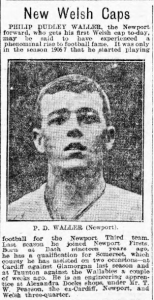Philip Dudley Waller
Rodney Parade is now home to the Newport Gwent Dragons Rugby Club. The entrance gate, however, serves as a memory to the club’s past. It is dedicated to the 85 members of Newport Athletics Club who lost their lives during the First World War.
A large number of the names can be found in other local memorials around Newport – for example, 18 are commemorated on the memorial at St Mark’s Church, five on the Newport High School Old Boys’ memorial and three at Victoria Avenue Methodist Church. Many of these men served with ‘local’ regiments – at least 24 were with the Monmouthshire Regiment, and at least 18 were South Wales Borderers.
However, six of these men were killed while fighting as members of overseas forces – three with the Canadians, and one each with the Australian, New Zealand and South African forces. This of course indicates that they had emigrated before the outbreak of war. People emigrated for many different reasons at the turn of the twentieth century, but one of the most unusual cases must be that of Philip Dudley Waller.
Philip was born in Bath in 1889, but later moved with his parents to Llanelli, where he began his rugby career. He was a gifted forward, and played his first game for Wales at the tender age of nineteen. The Evening Express of 12 December 1908 (football edition, p.2) described his achievement as “a phenomenal rise to football fame” – he’d only started playing for Newport’s third team in the 1906-7 season. In 1910 Waller was selected to play for the British Lions on tour in South Africa. It appears that he and one of his team-mates had such a good time there that he decided to stay. An article in the Evening Express entitled “Great Loss to Newport Club” ( 31 August 1910, p.4, second edition) stated that “it is definitely reported that P.D. Waller and Melville Baker, of Newport, who are now with the British team, will remain in South Africa.”
Sadly, Phillip Waller died on active service in France on 14 December 1917. He was buried at Red Cross Corner Cemetery near Arras. The Llanelli Star wrote that he had “a wide circle of friends who regret his untimely though glorious death.” A few months later, the Cambria Daily Leader reported the death of a brother – “Richard Percy Waller, R.A.F., has been killed at Montrose. He had gained his wings as a pilot only a week before his death” (3 June 1918, p. 3). The War memorial in their home town of Llanelli does not list the names of the servicemen commemorated there, but the names of both brothers can be found on the Carmarthen County War Memorial Roll.He settled in Johannesburg, even becoming a member of the town council there. The Llanelli Star reported that he enlisted into the South African Heavy Artillery in August 1915 because he was “a good sport in every sense of the term and full of patriotic fervour, he saw it to be his duty to do something for his country” (5 January 1918, p.1). Indeed, the Llanelli Star was eager to sing Phil Waller’s praises generally: “Personally, he was a charming young man. Of fine physique, abundant fervour, and highly attractive manner, he was a very popular officer, loved by the men and regarded with very great favour by his supervisors.”
Meg Ryder June 16th, 2017
Posted In: Uncategorized
